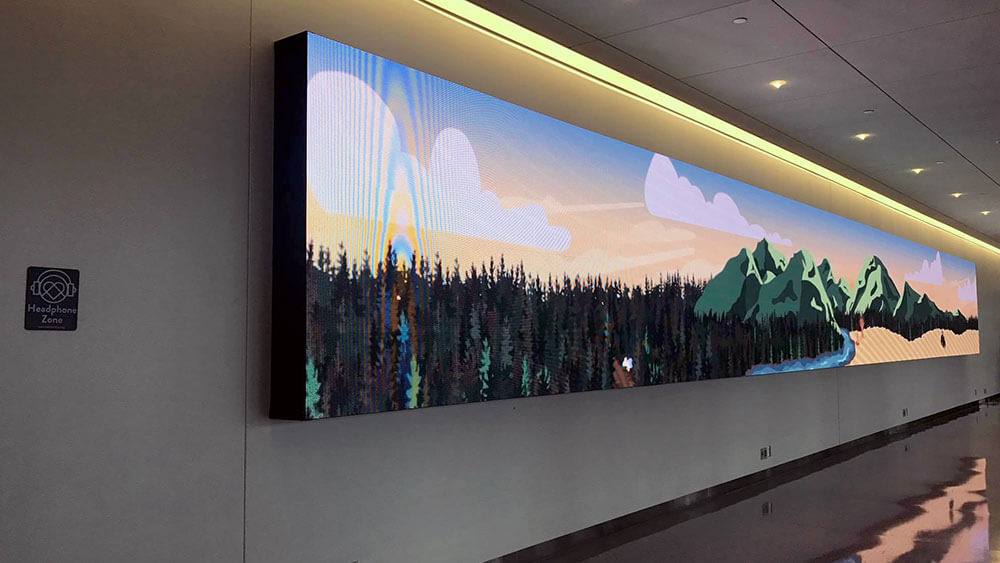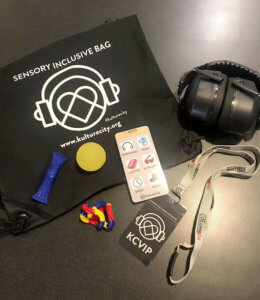
KultureCity helps venues identify loud spaces that might overwhelm guests with sensory needs, as well as quiet zones where guests can seek respite. “Headphone Zone” (above) and “Quiet Area” signs often are posted. (Photos courtesy KultureCity)
Around five years ago, Michele Kong, a physician, took her young son to the barbershop. As a child with autism, he was particularly sensitive to haircuts — which to him felt like tiny papercuts — and he would scream and cry as the barber worked. Another customer ran from the back of the shop, grabbed the young boy and shook him while berating Kong for not doing a better job of disciplining her son.
The incident was, naturally, personally upsetting to Kong. But it also demonstrated to her just how badly the world needed a greater acceptance of autism. So she and her husband, Julian Maha, also a physician, founded KultureCity, a Birmingham, Alabama–based, entirely volunteer-run nonprofit that aims to fight the stigma that comes with autism — as well as other sensory needs — and create inclusive spaces for everyone.
A large part of KultureCity’s work is helping venues and attractions earn a Sensory Inclusive Certification — a program for popular locations to become more welcoming to guests with sensory needs. This certification program was born three years ago, when KultureCity decided to carry out a case study at the Birmingham Zoo, Uma Srivastava, volunteer chief operating officer of KultureCity, told Convene. The organization selected hundreds of families whose members had various sensory needs and observed them every time they took a trip to the zoo. KultureCity also followed zoo staff members to learn how employees interacted with and helped these families. At the end of the study, Srivastava said, the staff asked for more training on how to work with individuals — and it was apparent that the venue itself needed more resources to help visitors — with sensory needs.

Noise-canceling headphones are among the items included in sensory bags from KultureCity.
Based on these findings, KultureCity then developed a certification program that works in three ways. First, the program trains venue employees on how to work with guests with sensory needs via a video series that touches on a wide variety of topics related to working with people who have sensory needs.
Next, KultureCity helps a leader at the location, such as a general manager, identify “quiet zones” that venues can carve out for guests who are feeling overstimulated, as well as “headphone zones” for particularly noisy areas that might disturb certain guests. “This is catered specifically to each venue,” Srivastava said, “otherwise, what’s the point?”
Finally, the program provides weighted lap pads and “sensory bags” for guests who forgot items at home that might bring them comfort when navigating a crowded space. The sensory bags include noise-canceling headphones, three different types of fidgets, “because different individuals prefer different touches and feels,” Srivastava said, “and a visual feeling thermometer, so that way individuals who are non-verbal can point to emotions like, ‘I’m tired,’ or ‘I’m confused.’” The bags are available for guests to check out at the venues for no additional cost.
Today, there are 350 venues in four countries that have become Sensory Inclusive Certified, including Lincoln Financial Field in Philadelphia, the Franklin Park Zoo in Boston, and the Rock and Roll Hall of Fame in Cleveland, in addition to smaller locations such as restaurants, dentist offices, and more, all of which are identifiable on the KultureCity app. Just recently added to the list is the Greater Columbus Convention Center (GCCC), which has become the first convention center in the world to become Sensory Inclusive Certified.
“Last year, we started noticing there were a lot of guests coming through with sensory needs,” said Amy Huggins, director of culture and training for GCCC, which hosts autism and disabilities conference OCALICON every year. “I started to brainstorm from a guest services standpoint — how could we have guests have a better experience when they come through these walls? And I was able to contact KultureCity earlier this year.”
In order to complete the certification program, KultureCity requires at least half of a venue’s staff to finish the video training, which is no small feat for large venues like convention centers. But so far, Huggins says 109 associates — primarily those who are guest-facing — have completed the program. And although the GCCC already had spaces that could work as quiet zones, the venue sought the expertise of KultureCity to determine what areas best fit their requirements.
“We had the spaces, but we hadn’t actually designated them as quiet zones,” Huggins said. “Now, they’re actually signed as quiet zones. When guests come and pick up a sensory bag, our guest services associates give them a map and explain where these locations are, so they know exactly where they need to head if they need that space.”
Since the Sensory Inclusive Certification program began, Srivastava said that the response has been overwhelming, from both the venues and the guests they serve. “If you go on social media, you’ll just see all these families posting and saying [things like], ‘Thank you. Because of KultureCity and,’ for instance, ‘the San Diego Padres, I was able to take my daughter to her first baseball game,’ or ‘We were able to enjoy three hours at the zoo, which has never happened before.’ And not to sound harsh, but it’s also increasing the venue’s bottom line, right? That’s more folks buying tickets, that’s more folks coming through the door and enjoying what you have to offer.”
To learn more about KultureCity’s work, visit kulturecity.org.
Casey Gale is an associate editor at Convene.
